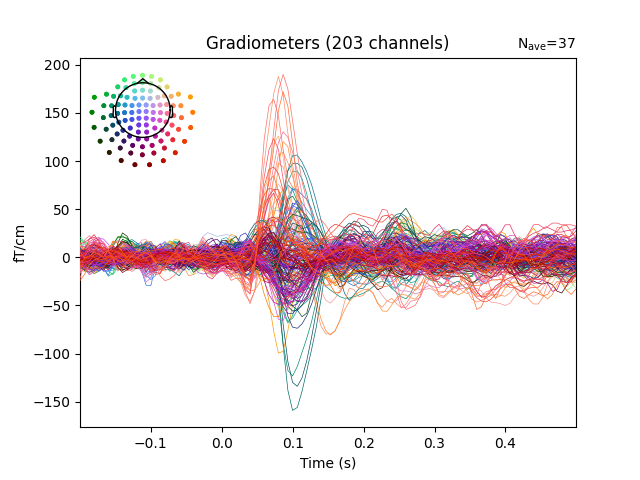Note
Go to the end to download the full example code.
Compute real-time evoked responses using moving averages#
This example demonstrates how to connect to an MNE Real-time server using the RtClient and use it together with RtEpochs to compute evoked responses using moving averages.
Note
The MNE Real-time server (mne_rt_server), which is part of mne-cpp, has to be running on the same computer.

Opening raw data file /home/circleci/mne_data/MNE-sample-data/MEG/sample/sample_audvis_filt-0-40_raw.fif...
Read a total of 4 projection items:
PCA-v1 (1 x 102) idle
PCA-v2 (1 x 102) idle
PCA-v3 (1 x 102) idle
Average EEG reference (1 x 60) idle
Range : 6450 ... 48149 = 42.956 ... 320.665 secs
Ready.
Reading 0 ... 41699 = 0.000 ... 277.709 secs...
Not setting metadata
Setting baseline interval to [-0.19979521315838786, 0.0] s
Applying baseline correction (mode: mean)
0 projection items activated
Just got epoch 1
NOTE: pick_types() is a legacy function. New code should use inst.pick(...).
Just got epoch 2
NOTE: pick_types() is a legacy function. New code should use inst.pick(...).
Just got epoch 3
NOTE: pick_types() is a legacy function. New code should use inst.pick(...).
Just got epoch 4
NOTE: pick_types() is a legacy function. New code should use inst.pick(...).
Just got epoch 5
NOTE: pick_types() is a legacy function. New code should use inst.pick(...).
Just got epoch 6
NOTE: pick_types() is a legacy function. New code should use inst.pick(...).
Just got epoch 7
NOTE: pick_types() is a legacy function. New code should use inst.pick(...).
Just got epoch 8
NOTE: pick_types() is a legacy function. New code should use inst.pick(...).
Just got epoch 9
NOTE: pick_types() is a legacy function. New code should use inst.pick(...).
Just got epoch 10
NOTE: pick_types() is a legacy function. New code should use inst.pick(...).
Just got epoch 11
NOTE: pick_types() is a legacy function. New code should use inst.pick(...).
Just got epoch 12
NOTE: pick_types() is a legacy function. New code should use inst.pick(...).
Just got epoch 13
NOTE: pick_types() is a legacy function. New code should use inst.pick(...).
Just got epoch 14
NOTE: pick_types() is a legacy function. New code should use inst.pick(...).
Just got epoch 15
NOTE: pick_types() is a legacy function. New code should use inst.pick(...).
Just got epoch 16
NOTE: pick_types() is a legacy function. New code should use inst.pick(...).
Just got epoch 17
NOTE: pick_types() is a legacy function. New code should use inst.pick(...).
Just got epoch 18
NOTE: pick_types() is a legacy function. New code should use inst.pick(...).
Just got epoch 19
NOTE: pick_types() is a legacy function. New code should use inst.pick(...).
Just got epoch 20
NOTE: pick_types() is a legacy function. New code should use inst.pick(...).
Just got epoch 21
NOTE: pick_types() is a legacy function. New code should use inst.pick(...).
Just got epoch 22
NOTE: pick_types() is a legacy function. New code should use inst.pick(...).
Just got epoch 23
NOTE: pick_types() is a legacy function. New code should use inst.pick(...).
Just got epoch 24
NOTE: pick_types() is a legacy function. New code should use inst.pick(...).
Just got epoch 25
NOTE: pick_types() is a legacy function. New code should use inst.pick(...).
Just got epoch 26
NOTE: pick_types() is a legacy function. New code should use inst.pick(...).
Just got epoch 27
NOTE: pick_types() is a legacy function. New code should use inst.pick(...).
Just got epoch 28
NOTE: pick_types() is a legacy function. New code should use inst.pick(...).
Just got epoch 29
NOTE: pick_types() is a legacy function. New code should use inst.pick(...).
Just got epoch 30
NOTE: pick_types() is a legacy function. New code should use inst.pick(...).
Just got epoch 31
NOTE: pick_types() is a legacy function. New code should use inst.pick(...).
Just got epoch 32
NOTE: pick_types() is a legacy function. New code should use inst.pick(...).
Just got epoch 33
NOTE: pick_types() is a legacy function. New code should use inst.pick(...).
Just got epoch 34
NOTE: pick_types() is a legacy function. New code should use inst.pick(...).
Just got epoch 35
NOTE: pick_types() is a legacy function. New code should use inst.pick(...).
Just got epoch 36
NOTE: pick_types() is a legacy function. New code should use inst.pick(...).
Just got epoch 37
NOTE: pick_types() is a legacy function. New code should use inst.pick(...).
Just got epoch 38
NOTE: pick_types() is a legacy function. New code should use inst.pick(...).
Waiting for epoch 39
Time of 2.0 seconds exceeded.
# Authors: Martin Luessi <mluessi@nmr.mgh.harvard.edu>
# Mainak Jas <mainak@neuro.hut.fi>
#
# License: BSD (3-clause)
import matplotlib.pyplot as plt
import mne
from mne.datasets import sample
from mne_realtime import RtEpochs, MockRtClient
print(__doc__)
# Fiff file to simulate the realtime client
data_path = sample.data_path()
raw_fname = data_path / 'MEG' / 'sample' / 'sample_audvis_filt-0-40_raw.fif'
raw = mne.io.read_raw_fif(raw_fname, preload=True)
# select gradiometers
picks = mne.pick_types(raw.info, meg='grad', eeg=False, eog=True,
stim=True, exclude=raw.info['bads'])
# select the left-auditory condition
event_id, tmin, tmax = 1, -0.2, 0.5
# create the mock-client object
rt_client = MockRtClient(raw)
# create the real-time epochs object
rt_epochs = RtEpochs(rt_client, event_id, tmin, tmax, picks=picks,
decim=1, reject=dict(grad=4000e-13, eog=150e-6))
# start the acquisition
rt_epochs.start()
# send raw buffers
rt_client.send_data(rt_epochs, picks, tmin=0, tmax=150, buffer_size=1000)
for ii, ev in enumerate(rt_epochs.iter_evoked()):
print("Just got epoch %d" % (ii + 1))
ev.pick_types(meg=True, eog=False) # leave out the eog channel
if ii == 0:
evoked = ev
else:
evoked = mne.combine_evoked([evoked, ev], weights='nave')
plt.clf() # clear canvas
evoked.plot(axes=plt.gca(), time_unit='s') # plot on current figure
plt.pause(0.05)
Total running time of the script: (0 minutes 17.606 seconds)
Estimated memory usage: 502 MB